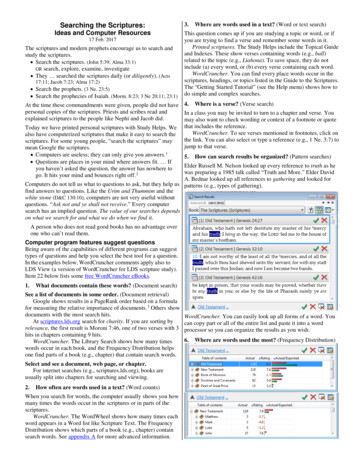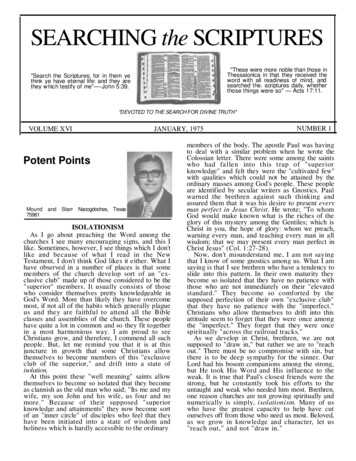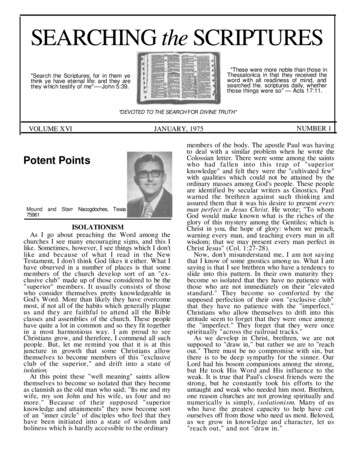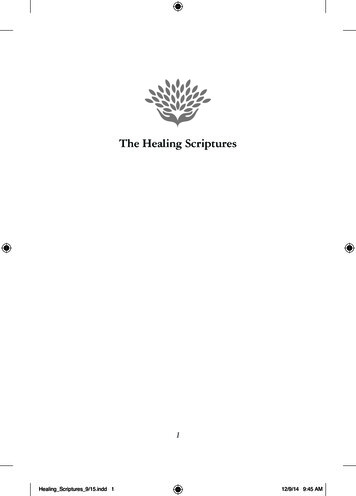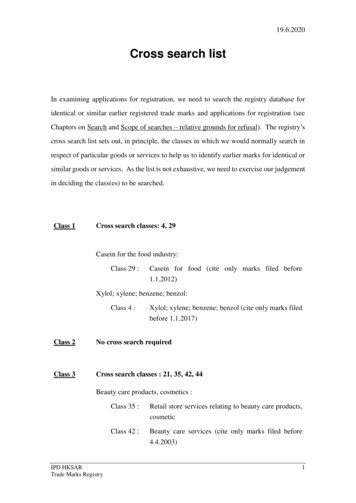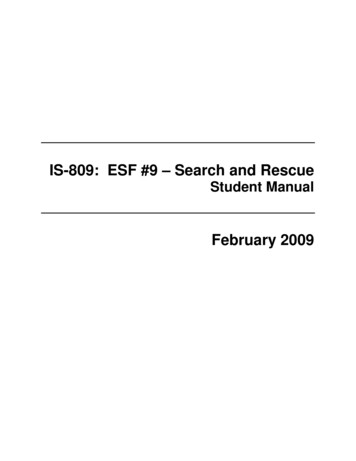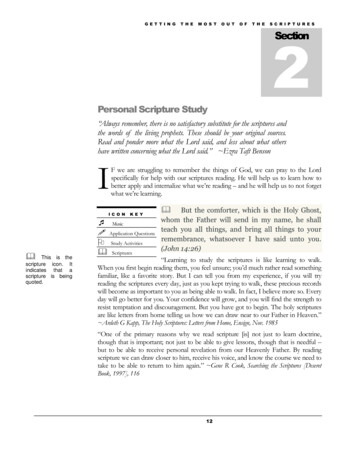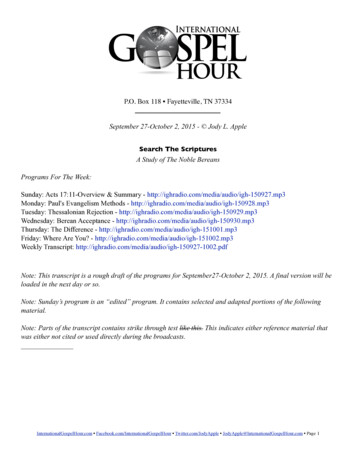
Transcription
P.O. Box 118 Fayetteville, TN 37334September 27-October 2, 2015 - Jody L. AppleSearch The ScripturesA Study of The Noble BereansPrograms For The Week:Sunday: Acts 17:11-Overview & Summary - ay: Paul's Evangelism Methods - day: Thessalonian Rejection - esday: Berean Acceptance - sday: The Difference - ay: Where Are You? - ly Transcript: fNote: This transcript is a rough draft of the programs for September27-October 2, 2015. A final version will beloaded in the next day or so.Note: Sunday’s program is an “edited” program. It contains selected and adapted portions of the followingmaterial.Note: Parts of the transcript contains strike through test like this. This indicates either reference material thatwas either not cited or used directly during the broadcasts.InternationalGospelHour.com Facebook.com/InternationalGospelHour Twitter.com/JodyApple JodyApple@InternationalGospelHour.com Page 1
Monday: Paul's Evangelism Methods - oduction: Thank you Jay.And welcome to our study. This week’s theme—“Search The Scriptures”—includes a total of sixlessons: one 30-minute and five 15-minute lessonsThe first broadcast of 30-minutes airs on Sunday and introduces the theme.The daily—Monday-Friday—15-minute programs develop the weekly theme in more detail.Today’s program is the first of the extended 15-minute programs for the week.To hear all six lessons click the “media” tab at our website InternationalGospelHour.com to freelydownload the audio and transcript files.Let’s get started.Weekly Theme: This week’s theme—“Search The Scriptures”—comes from Acts 17:11 where we read: “These weremore fair-minded than those in Thessalonica, in that they received the word with all readiness, andsearched the Scriptures daily to find out whether these things were so.” Through the course of our studies we will examine:Paul’s methods in spreading the gospel. (Monday)⁃The negative results at Thessalonica (Tuesday)⁃The positive results at Berea (Wednesday)⁃The difference between the Thessalonians and the Bereans (Thursday)⁃And, finally, we finish our study with this question: “Where are you?” (Friday)⁃ Today’s thoughts focus on: “Paul’s methods in spreading the gospel.”Today’s Passage: Acts 17:1 Now when they had passed through Amphipolis and Apollonia, they came to Thessalonica,where there was a synagogue of the Jews. 2 Then Paul, as his custom was, went in to them, and forthree Sabbaths reasoned with them from the Scriptures, 3 explaining and demonstrating that the Christhad to suffer and rise again from the dead, and saying, “This Jesus whom I preach to you is the Christ.”4 And some of them were persuaded; and a great multitude of the devout Greeks, and not a few of theleading women, joined Paul and Silas.Today’s Context: “They came to Thessalonica”Paul and and his companions traveled along the Egnatian Way: “the road leading west from Byzantiumto the Adriatic sea—Paul, Silas, and Timothy travel a hundred miles from Philippi to Thessalonica. . From there, the entire province can hear the gospel message, as in fact happened (see 1 Thess. 1:8).[Clinton E. Arnold, “Acts,” in John, Acts (vol. 2 of ZIBBCNT, ed. Clinton E. Arnold; Accordanceelectronic ed. 4 vols.; Grand Rapids: Zondervan, 2002), n.p.]Paul’s route and destination reflects a pattern seen throughout his journeys: He travels to larger cities inhopes that the gospel preached would radiate throughout their respective regions.InternationalGospelHour.com Facebook.com/InternationalGospelHour Twitter.com/JodyApple JodyApple@InternationalGospelHour.com Page 2
That this practice worked is proven in remark in 1 Thessalonians 1:8 - “For from you the word of theLord has sounded forth, not only in Macedonia and Achaia, but also in every place. Your faith towardGod has gone out, so that we do not need to say anything.”What Paul did here he repeated elsewhere. Later in his journeys Paul came to the city of Ephesus, whereaccording to Acts 19:9-10, he was “reasoning daily in the school of Tyrannus.” The following verse tellus that “this continued for two years, so that all who dwelt in Asia heard the word of the Lord Jesus,both Jews and Greeks.”Paul’s purpose, then, in traveling to Thessalonica demonstrates a consistency in his methods.Today’s Context: “Where there was a synagogue of the Jews”When we start reading the new testament we don’t proceed very far until we encounter the term“synagogue.” What was the synagogue? Who met there? What was its purpose? How did it figure intothe culture of the first century world? And why was Paul always going out of his way to visit one?Let’s tackle some of those questions:“The importance of the synagogue for Judaism cannot be overestimated. More than any otherinstitution it gave character to the Jewish faith. Here Judaism learnt its interpretation of the law. Unlike the Temple, it was located in all parts of the land, and put the people in touch withtheir religious leaders. [“SYNAGOGUE,” NBD, 1142., italics-jla]In the 1st century AD synagogues existed wherever Jews lived. The Gospels speak of thesynagogues of Nazareth (Mt. 13:54; Lk. 4:16) and Capernaum (Mk. 1:21; Jn. 6:59) as placeswhere our Lord ministered. The apostle Paul found them wherever he went in Palestine, AsiaMinor and Greece.” [“SYNAGOGUE,” NBD, 1142.]The synagogue was, literally, a meeting-place, ‘a synagogue for reciting the Law and studyingthe commandments’. It was especially a place for prayer (proseuche), like the Temple (see Mt.21:13, etc.; Acts 16:13). [“SYNAGOGUE,” NBD, 1143.]Today’s Thoughts:The Spirit of God: Revealed the word of God to the apostles in both oral and written form Empowered the apostles to give miraculous gifts to Christians in the first century And directed the spread of the Gospel in the early days of the churchAs part of that process we observe several things about Paul’s tactics in spreading the gospel: Paul went to major cities: The spread of the gospel in the book of Acts occurred according to a (1) divine mandate, the great commission. (Mt. 28:18ff; Mk. 16:15ff; Lk. 24:45ff; Acts 1:8); (2) it occurred for a divinely ordained purpose (redemption/salvation, same passages); and (3) according to a divinely directed method (Acts 1:8; 17:3ff). We see a pattern established in Acts 1:8 where the gospel is predicted by the Lord to move fromJerusalem, to Judea, to Samaria and then to the uttermost part of the world. This addresses the geographical spread of the gospel of Christ. Paul’s work as an apostle to the Gentiles was a key part of that geographical spread. Paul’s mission trips frequently focused on major cities: Antioch, Ephesus, Thessalonica, AthensInternationalGospelHour.com Facebook.com/InternationalGospelHour Twitter.com/JodyApple JodyApple@InternationalGospelHour.com Page 3
Paul’s outreach targeted audiences in schools (Tyrannus), synagogues and marketplaces; Acts19:10 tells us that the work he did in the school of Tyrannus reverberated throughout AsiaToday’s passage, Acts 17:1-4, tells us that Paul went to the synagogues It was his custom. The synagogues were the weekly meeting center for first-century Jews. Paul, raised as a Jew, had a common interest with them in the teaching of the first, or old,covenant. It was natural for him, then, to attend synagogues as part of his tactics for spreading the gospel.Consider Paul’s teaching methods. The text says that “for three Sabbaths (Paul) reasoned with them from the Scriptures.” As we think about the word “reasoned” we understand that Paul:“1. to engage in speech interchange, converse, discuss, argue” (“diale gomai,” BDAG, 232.);⁃“2. to instruct about someth., inform, instruct” (“diale gomai,,” BDAG, 232.)⁃ The gospel is reasonable.New testament Christianity involves the surrender of the soul, in all of its faculties, to the will of⁃God.That means the gospel must touch each soul: rationally, emotionally, morally, volitionally and⁃behaviorally, and that it must do so in the context of our temporal life in view of an immortal/eternal life.Accordingly, the gospel must be reasonable.⁃It comes from the mind of God, presented in language consistent with God’s will, and is directed⁃to the mind of man (who, created in the divine image has the ability to perceive God’s will —bydesign), so that at the end of the process we will have the mind of God/Christ/Spirit.This is the intent of 1 Corinthians 2:9-16, concluding with: “we have the mind of Christ” (cf.⁃Eph. 3:1ff)It is for this reason that we see the preaching of the gospel to be more than an emotional plea,⁃though it certainly involves that.The presentation of the good news of Christ and his kingdom is also more than a moral plea,⁃though it certainly involves that.Teaching the truth is more than a plea for a hearer to “just” surrender his/her will to that of the⁃Godhead, though it certainly involves that.And, finally, the proclamation of truth involves more than a call to change our actions, though it⁃certainly involves that.First, and foremost, from our present perspective, is this: the gospel must appeal to our sense of⁃reason.God does not want followers to do so blindly, that is without evidence that produces conviction.⁃Biblical evidence leads to specific conclusions. Nicodemas realized that Christ was more than a⁃mere man. Why? Because the evidence demanded that conclusion.The purpose statement of the book of John demands that perspective as well. Signs, functioning⁃as evidence, produced faith. That faith, when complete, leads to redemption (John 20:30-31).Biblically speaking, there exists no saving faith apart from convincing evidence.InternationalGospelHour.com Facebook.com/InternationalGospelHour Twitter.com/JodyApple JodyApple@InternationalGospelHour.com Page 4
⁃When Paul went into the synagogues, he engaged in just that—the presentation of convincingevidence. (Note the citations re that from Acts 17:3, 17; et. Al. In the book of Acts that show thisto be the case. Consider Paul’s central authority:The text states that Paul “reasoned with them from the Scriptures.”⁃What the Scriptures said was what God said.⁃In principle, and practice, Paul did just what Christ did when he taught the two men on the way⁃to Emmaus. He opened their understanding from the teaching of the law, the prophets and thewritings (cf. Luke 24:44ff) Consider Paul’s central message: It was the good news of the Christ. That message is summed up inthree simple, but powerful, truths:Christ had to suffer.⁃Christ had to raise again from the dead.⁃And Paul had to preach this message: “This Jesus whom I preach to you is the Christ.”⁃Over the course of three Sabbaths, Paul taught the Thessalonians synagogue that Christ greater⁃than the kings of Judah.Each king in Judah became king, reigned and died.⁃But Christ died first, then became king and reigned.⁃This was beyond human capability and demonstrated the deity of Jesus.⁃It proved what Peter said about Jesus in Acts 2: God made this Jesus both Lord and⁃Christ)Finally, the resurrection of Christ demonstrated his Lordship (Rom 1:4)⁃ Note Paul’s methods: He explained and demonstrated that Jesus had to suffer and resurrect.To explain means to “open up” and “to reveal” [explaining G1272 dianoi gw, dianoigoœ;⁃[GNT-T] dianoi gwn dianoigoœn Verb pres act part masc sing nom to open up, reveal]It’s what Paul did when he taught Lydia in Acts 16:12ff. Paul taught Lydia and she “heeded (paid⁃attention to) the things spoken by Paul.”It’s what Jesus did when he taught Cleopas and his friend in Luke 24:44ff. Jesus “opened their⁃understanding, that they might comprehend the Scriptures.” He showed them, based on what waswritten, that it was necessary for him to suffer and die.Paul, using the Scriptures, did the same thing in the Thessalonian synagogue.⁃Paul also “demonstrated” that Jesus had to suffer and resurrect. The idea behind “demonstrated”⁃is this: something is placed before you. In some biblical contexts it’s food, but in others, likehere, it’s an idea, a teaching, a concept. What is placed before you in this passage is more alongthe lines of “2. to set forth in teaching, a. act. put before ti« someth. (X., Cyr. 1, 6, 14; Lucian,Rh. Pr. 9 paradei gmata al.; Ex 19:7; 21:1; Just., A I, 12, 11) parabolh\n pare qhkenaujtoi ß Mt 13:24, 31.; b. mid., demonstrate, point out (POxy 33 verso III, 12; Jos., Vi. 6)dianoi gwn kai« paratiqe menoß o ti Ac 17:3.—28:23 v.l.” (“parati qhmi,” BDAG, 772.)The language here means: “paratiqe menoß pres. mid. part. parati qhmi (G4192) to place⁃alongside, to allege, to present evidence, to establish evidence to show that something is true(LN, 1:673; MM; Preisigke, 2:258). Here it is the bringing forward of proof passages ofScripture (EGT ). Pres. part. emphasizes the continuing action and describes the means ormethods of Paul’s reasoning and argumentation.” (Cleon L. Rogers Jr. and Cleon L. Rogers III,InternationalGospelHour.com Facebook.com/InternationalGospelHour Twitter.com/JodyApple JodyApple@InternationalGospelHour.com Page 5
The New Linguistic and Exegetical Key to the Greek New Testament, Accordance electronic ed.Grand Rapids: Zondervan, 1998, n.p.) In our next lesson, we will focus on the negative reaction of the Thessalonians. See you then.Here’s Jay.InternationalGospelHour.com Facebook.com/InternationalGospelHour Twitter.com/JodyApple JodyApple@InternationalGospelHour.com Page 6
Tuesday: Thessalonian Rejection - oduction: Thank you Jay.And welcome to our study. This week’s theme—“Search The Scriptures”—includes a total of sixlessons: one 30-minute and five 15-minute lessonsThe first broadcast, a 30-minute program, usually airs on Sunday each week. It introduces the series.The daily—Monday-Friday—15-minute programs develop the weekly theme even further.Today’s program is the second of the extended 15-minute programs for the week.To hear all six lessons in this study click the “media” tab at our website InternationalGospelHour.com tofreely download the audio and transcript files.Let’s get started.Weekly Theme: This week’s theme—“Search The Scriptures”—comes from Acts 17:11 where we read this: “These weremore fair-minded than those in Thessalonica, in that they received the word with all readiness, andsearched the Scriptures daily to find out whether these things were so.” Through the course of our studies we will examine:Paul’s methods in spreading the gospel.⁃The negative results at Thessalonica⁃The positive results at Berea⁃The difference between the Thessalonians and the Bereans⁃And, finally, we finish our study with this question: “Where are you?”⁃ Today’s thoughts focus on: “The negative results at Thessalonica.”Today’s Passage: Acts 17:5 But the Jews who were not persuaded, becoming envious, took some of the evil men fromthe marketplace, and gathering a mob, set all the city in an uproar and attacked the house of Jason, andsought to bring them out to the people. 6 But when they did not find them, they dragged Jason and somebrethren to the rulers of the city, crying out, “These who have turned the world upside down have comehere too. 7 Jason has harbored them, and these are all acting contrary to the decrees of Caesar, sayingthere is another king—Jesus.” 8 And they troubled the crowd and the rulers of the city when they heardthese things. 9 So when they had taken security from Jason and the rest, they let them go.13 But when the Jews from Thessalonica learned that the word of God was preached by Paul at Berea,they came there also and stirred up the crowds.Today’s Thoughts: Verse four tells us: “And some of them were persuaded; and a great multitude of the devout Greeks, andnot a few of the leading women, joined Paul and Silas.” The following verse starts with “but the Jews,”indicating that there was a sharp contrast between those who were persuaded and those who were not.What does it mean to teach that the Jews were not persuaded?InternationalGospelHour.com Facebook.com/InternationalGospelHour Twitter.com/JodyApple JodyApple@InternationalGospelHour.com Page 7
In the biblical context of evangelism to be persuaded is to be convinced that the information beingshared, namely the gospel, was indeed true.The root term is translated in the new testament as persuade, trust, satisfy, appease, etc.It means: “1. act., except for 2 perf. and plpf.: to cause to come to a particular point of view or course ofaction.” (“pei qw,” BDAG, 791.)It is used primarily in the sense of convincing, persuading, appealing to. (Cf. BDAG, 791, 1st defs.)Those who are subject to persuasion are said to “to be so convinced that one puts confidence in someth.”They “depend on, trust in” and are said to “be convinced, be sure, certain.” (Cf. BDAG, 792.)In this setting, the passage is used most like what we see in Acts 18:4 - “And he reasoned in thesynagogue every Sabbath, and persuaded both Jews and Greeks.” Here the passage is used in the senseof “1. act., except for 2 perf. and plpf.: to cause to come to a particular point of view or course of action.,a. convince w. acc. of pers. (X., Mem. 1, 2, 45 al.) ISm 5:1. e¶peiqen Δ Ioudai ouß kai« ›Ellhnaß hetried to convince Jews and Gentiles Ac 18:4.”; “pei qw,” BDAG, 791.)The only way that someone could determine whether or not the gospel was true, would be to hearcompelling evidence that demonstrated its truthfulness.In this context persuasion is based on Scriptural evidence. In fact, there is nothing in the New Testamentthat allows for anything other than this sort of persuasion.Persuasion is not just: being asked or force to believe. It is not just going along with the crowd.The Jews were not convinced that Jesus was really the Messiah of the Old Testament.The evidence Paul presented, as seen in the opening verses, was designed to prove that Jesus was theMessiah.For some reason they rejected the evidence that Paul offered.1 Thessalonians 5:23 instructs Christians to prove all things and hold fast to what is good.Proof means that evidence must be offered. That the evidence must be considered. And a conclusion, foror against, the claim must be made.The Jews in Thessalonica were not persuaded. They rejected the teaching that Paul offered.Man, created in the image of God, possesses divinely instilled faculties:we have the ability to think like God thinks;⁃we have the ability to feel like God feels;⁃we have the ability to measure morality as God measures morality;⁃we have the ability to direct our will in concert with God’s will;⁃and finally, we have the ability to behave as God desires.⁃In some respect the Jews failed to live up to the faculties God gave them.The text does not say that they failed rationally, or that they failed emotionally, or that they failedmorally, or that they failed willfully But it does indicate that they failed behaviorally.A quick observation here: the Gospel is not always rejected because of reason, but rather because of ourwill, conscience and emotion.Paul reasoned in the synagogues from the Scriptures that Jesus was the Christ.He did not simply ask them to believe, or to pray, or to change, or to accept what he taught.For persuasion to occur all of our faculties must be engaged: we must trust the gospel rationally; wemust love the gospel emotionally; we must submit to the gospel willfully and morally; and we mustbehave accordingly.What does persuasion have to do with Paul’s preaching?Absolutely everything. When souls are fully persuaded, they are fully converted. They stop being whatthey used to be — the old man dies — and they start being what God wants them to be — new creaturesbegotten by the gospel.InternationalGospelHour.com Facebook.com/InternationalGospelHour Twitter.com/JodyApple JodyApple@InternationalGospelHour.com Page 8
Today’s Thoughts: “Becoming envious” Why did the Jews become envious? The passage indicates that is was because of jealousy that the Jews reacted as they did. zhlw¿santeß aor. act. part. (causal) zhlo/w (G2420) to be jealous, to feel strong envy and resentmentagainst someone (LN, 1:760). [Cleon L. Rogers Jr. and Cleon L. Rogers III, The New Linguistic andExegetical Key to the Greek New Testament (Accordance electronic ed. Grand Rapids: Zondervan,1998), n.p.] What were they envious of?Perhaps they were envious because they were losing influence.⁃Prior to Paul’s arrival they were leaders. Paul challenged that. If Paul was right and they were⁃wrong, they lost their position.They refused, or at least resisted, the “new truth” that Paul brought. They became rebellious.⁃From their point of view, Jesus was not the Messiah. Their “messiah” was powerful like David,⁃influential and wealthy like Solomon. Jesus, for them, was neither.One of the most important elements of the Christian life is humility and submission. Humility, that isthe absence of pride, must exist within the heart and mind of those who wish to obey God in Christ. Ifthere is no sense of humility within us, they will be no sense of submission. Humility does not equalweakness, but rather reflects a reasoned response to the evidence presented.Facts are stubborn things. We cannot change the way things really are, though we can change the waywe think about those things.The gospel is, in this sense, stubborn, or unchangeable. We can think differently about it, change it inour minds and in our practices, as did the Galatian churches, but in the end we haven’t really changedthe gospel Only our response to it. Luke’s account of the parable of the sower teaches a very powerful principle. Note what the passagesays: “But the ones that fell on the good ground are those who, having heard the word with a noble andgood heart, keep it and bear fruit with patience.” (Lk. 8:15)Observe that the seed, in this setting the word of God (Lk. 8:11), must fall on good ground in⁃order to produce what God wants.The good ground here are the souls of those who hear God’s word, are noble, and have good⁃hearts.Stubbornness is not fitting the Christlike life.⁃ Did Paul have something that they did not?What Paul had, was not something that he had because he was somebody special — he did not⁃create the gospel — but rather something that was given directly to him by the Christ (cf.Galatians 2-3).Paul considered the preaching of the gospel and obligation, something he owed the rest of the⁃world. That’s what he meant when he said “I am debtor.” He owed no physical things, nomoney, but he owed everyone the opportunity to hear the gospel (cf. Romans 1:14ff).Did Paul have something that they wanted?⁃No, but Paul had something they needed. In fact, Paul had something that everyone needs.⁃The problem, was that they didn’t want it.⁃Our problem might be the same We may not want the gospel, but we certainly do need it.⁃InternationalGospelHour.com Facebook.com/InternationalGospelHour Twitter.com/JodyApple JodyApple@InternationalGospelHour.com Page 9
The Negative Results: Note just how far the negative results of the disbelieving Jews were. Their envy caused them: To start an uproar in the community To persecute, punish and penalize Jason To misrepresent Jesus’ role as king To pursue Paul and Silas to Berea and create similar problems thereAttitudes To Note: What happens when you are wrong, but you do not want to admit your are wrong? Our natural assumption: we believe we are right. We do not usually believe something because we know it is wrong. That doesn’t make sense. We believethings assuming they are right. We may not have the evidence to back it up, but we still have the conviction to believe it. Consider this: That’s what Paul experienced in Thessalonica. Jews who believed truth—God’s oldtestament revelation—but only up to a point. They claimed to believe in God’s word, but they did not believe that Jesus was the Christ. What happens when we find ourselves in similar circumstances. In our next lesson, we will focus on the positive reaction of the Bereans. See you then. Here’s Jay.InternationalGospelHour.com Facebook.com/InternationalGospelHour Twitter.com/JodyApple JodyApple@InternationalGospelHour.com Page 10
Wednesday: Berean Acceptance - oduction: Thank you Jay.And welcome to our study. This week’s theme—“Search The Scriptures”—includes a total of sixlessons: one 30-minute and five 15-minute lessonsThe first broadcast, a 30-minute program, usually airs on Sunday each week. It introduces the series.The daily—Monday-Friday—15-minute programs develop the weekly theme even further.Today’s program is the third of the extended 15-minute programs for the week.To hear all six lessons in this study click the “media” tab at our website InternationalGospelHour.com tofreely download the audio and transcript files.Let’s get started.Weekly Theme: This week’s theme—“Search The Scriptures”—comes from Acts 17:11 where we read this: “These weremore fair-minded than those in Thessalonica, in that they received the word with all readiness, andsearched the Scriptures daily to find out whether these things were so.” Through the course of our studies we will examine:Paul’s methods in spreading the gospel.⁃The negative results at Thessalonica⁃The positive results at Berea⁃The difference between the Thessalonians and the Bereans⁃And, finally, we finish our study with this question: “Where are you?”⁃Today’s thoughts focus on: “The positive results at Berea.”Today’s Passage:Acts 17:10 Then the brethren immediately sent Paul and Silas away by night to Berea. When they arrived, theywent into the synagogue of the Jews. 11 These were more fair-minded than those in Thessalonica, in that theyreceived the word with all readiness, and searched the Scriptures daily to find out whether these things were so.12 Therefore many of them believed, and also not a few of the Greeks, prominent women as well as men.Today’s Thoughts:Our first point of emphasis here is: The changes we see in Acts 17 are dramatic. It starts with what might be seen as a rather subtle change:Paul and Silas changed locations.⁃In the night, brethren at Thessalonica sent Paul and Silas away.⁃Where did they go? They traveled to the next city, Berea, about 50 miles away from⁃Thessalonica. But the rest of the passage tells us about an even greater change. What Paul and Silas witnessed next was a change in attitude, a change in character and a change inresponse.InternationalGospelHour.com Facebook.com/InternationalGospelHour Twitter.com/JodyApple JodyApple@InternationalGospelHour.com Page 11
Our second point of emphasis overshadows the first: Though Paul and Silas traveled from Thessalonica to Berea, their approach did not change.They started the same process all over again.⁃They went to the synagogue in Berea, just as they had done in Thessalonica.⁃This is consistent with the method that we witnessed earlier:⁃Paul went to major cities.⁃Paul went to synagogues in those cities?⁃Paul reasoned with the Jews in the synagogues, and he did so from the Scriptures.⁃His main point: Jesus was the Messiah.⁃ But what happened in Berea was radically different from what happened in Thessalonica. Why?Because, the residents in Berea were different.⁃They received the word with readiness.⁃They searched the Scriptures daily.⁃They sought to find out whether or not Paul’s message was genuine.⁃Having gone through this investigative process, many of them believed Paul’s message.⁃ We want to understand, as much as possible, the full extent of the differences between theThessalonians and the Bereans. To do so we will ask and answer the following questions:What does it mean to say that the Bereans were more fair-minded?⁃What does it mean to say that they received the word with all readiness?⁃How did they search the Scriptures daily?⁃How did they determine whether or not the things that Paul taught were just as he said they⁃were? By answering these questions we will have a better understanding of their differences.More importantly, we will have a better model that we can copy in our own lives.Let’s look at those four questions.1.What does it mean to say that the Bereans were more fair-minded?The Bereans were ascribed nobility. Their nobility was not due to ancestral heritage or social⁃status (Lk 19:12). Rather, their nobility reflected “a willingness to learn and evaluate somethingfairly.” (Louw and Nida, 27.48). For this reason some translations render the term eujgene steroias noble, or fair, minded (NASB, NAS95, NKJV). The term indicates their willingness to bereceptive to Paul’s message (cf. NRSV). Sadly, there are not enough souls that have this mindset,and few ancestrally or socially noble people show a Berean spirit (1 Cor 1:26).2.What does it mean to say that they received the word with all readiness?The word “received” simply tells us that the Bereans accepted something that was offered to⁃them. They welcomed Paul and they listened to his message.The term readiness means: “proqumi a, aß, hJ (pro/qumoß; Hom. et al.; ins, pap; Sir 45:23;⁃TestSol; TestJob 11:1; EpArist, Philo, Joseph.) exceptional interest in being of service,willingness, readiness, goodwill,” “proqumi a,” BDAG, 870)InternationalGospelHour.com Facebook.com/InternationalGospelHour Twitter.com/JodyApple JodyApple@InternationalGospelHour.com Page 12
⁃⁃3.In this setting there is an “Ac 17:11 here w. emphasis on goodwill and absence of prejudice(FDanker, NTS 10, ’64, 366f)”, “proqumi a,” BDAG, 870)Two key elements, then, relate to the Bereans: they were noble, or fair-minded, and th
This week’s theme—“Search The Scriptures”—includes a total of six lessons: one 30-minute and five 15-minute lessons The first broadcast of 30-minutes airs on Sunday and introduces the theme. The

